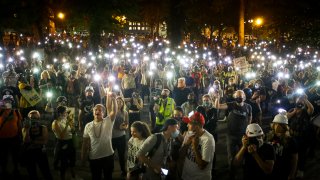
Educators from around the country have been reflecting on what they teach and how they teach it in the wake of the death of George Floyd and the national protests that followed, NBC News reports.
Some lessons up for reconsideration: the dismissive take that it was simply "the norm" that Presidents George Washington and Thomas Jefferson owned slaves in the late 1700s and language around Christopher Columbus' "discovery" of America.
"You're messaging that people were not here thousands of years before Columbus," said Stefanie Wager, a former teacher in Des Moines, Iowa, who is president of the National Council for the Social Studies.
As the nation faces a moment of racial reckoning, many long-held conceptions are being challenged, as seen in the toppling of Confederate monuments and the push to defund police. What's taught in U.S. classrooms is no exception. NBC News spoke with teachers around the country who said they were working to reshape lesson plans to better reflect the fullness of America's multicultural history.
Additions to history classes might include lessons on intersectional figures, such as Bayard Rustin, the Black man who organized the 1963 March on Washington but was largely shunned in the civil rights movement because he was gay.
Read the full story on NBCNews.com

